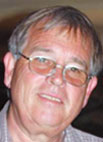
Farming and ranching facilities are never the same.
In this case, Woodstone North Ranch, the original ranching facility, is located in Hackett, Ark., with a newer out-of-state facility in New Ulm, Texas. This successful ranch sells breeding stock by private treaty only and has a solid reputation beginning with extensive showing in the 1980s and furthered by high-quality production standards. Owner Bill Woods, an orthopedic surgeon in Houston, Texas, is in control of the genetic development of his herd but leaves running the Arkansas branch to his ranch manager, Kirby Vaughn.
Kirby is a man with three cowboy hats: ranch manager, half owner of Sink or Swim Rodeo Company and cowboy church preacher. Kirby’s first cowboy hat is donned because he uses horses to work cattle.
“My job at the ranch is to take care of whatever part of the herd is here because cattle are moved back and forth according to the owner’s genetic plans and where feed is the cheapest for those being backgrounded and subsequently sent to feedlots,” Kirby said,
The owner comes once or twice a year to look over the herd and make decisions about which animals will be retained for breeding stock and which will be sent to feedlots.
The North Ranch has more than 1,200 acres with the number of registered Angus mommas hovering around 200. They are serviced by six registered Angus bulls although AI and embryo transplant are also used at the Texas facility. The bulls are kept with the mommas for three months with the mommas organized for winter feeding into six breeding groups depending upon when the calves will be born. The North Ranch cow-calf operation requires little banding or castrating because all of the animals are potential breeding stock.
Kirby likes Angus cattle because he rarely has to pull a calf and the mother’s milk supply is sufficient to raise good, strong calves. The calves are tagged one or two days after birth.
“Some of the mommas get very excited and try to climb my horse, but my boss says that the good mommas are the ones that try to kill you,” Kirby said.
Fence line weaning is used so the mothers will be nearby and the process less stressful and quicker, usually within a day or two, even though, according to Clint, some of the older mommas just wonder off.
Winter feeding is supplemented by all natural tubs and hay while the herd is grass fed during the summer. The herds are “mob fed” during the summer so Kirby and his helpers can clean up the rest of the land in preparation for winter and the division of the herd into their breeding groups. Regardless of the time of year, all cattle receive a good mineral program custom formulated for this area based upon soil samples.
To maintain the natural care process, the cattle are administered all natural vaccines. Pour on wormer is used every 30 days until fall when the cattle are injected with a wormer.
“In order to prevent immunity, we switch brands year-to-year,” Kirby said,
Haying is a time-consuming part of Kirby’s job. The 350 acres used for hay are natural grass with Bermuda being the predominant grass after the first cutting. Chicken litter is used as fertilizer and generally last two years before being reapplied.
Kirby, wearing his second cowboy hat, always loved rodeos and wanted something more exciting than his commercial herd. About five years ago he started a rodeo cattle herd.
He and his daughters have 50 mommas but partner with Dustin Dunn with 30 bulls for rodeos and 16 still to be determined for suitability. Testing takes place with a lightweight dummy when the bulls are yearlings. The company submits bids and puts on junior rodeos in Arkansas, Texas and Oklahoma. They also a large senior event at the Tulsa RV Ranch where people sometimes use walkers to get to the bulls before riding. Profits from this event are used for helping handicapped children in Claremore and Sycamore Springs, Okla., Finally, Kirby and Dustin run charity events at their church and are finishing an arena to make holding them easier.”
Kirby’s father was a member of the Baptist Missionary Association and began several churches with Kirby choosing to return to Arkansas after high school. Kirby’s third cowboy hat is serving as speaker for the Cowboy Church in Greenwood, Ark., which has about 100 members.
“You don’t see a lot of suits, and the message is the same even though the path getting there may be very different,” Kirby said.
For Kriby, his cowboying roots run deep, and the single father is quick to brag about the next generation – which features two cowgirls.
“Wearing cowboy hats runs in the family,” he said. “My daughter Rain, 12, enjoys flanking the bucking bulls at rodeos while my youngest one Prairie, 9, is a much more interested in barrel racing. Both, however, gather up cattle for me.”







